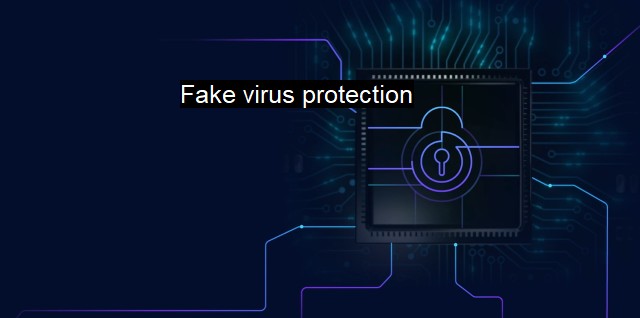What is Fake virus protection?
The Dangers of "Fake Virus Protection": How to Protect Your Computer from Stealth Malware
"Fake virus protection" is a term that refers to deceptive software that masquerades as legitimate antivirus programs but, in reality, have malicious intent and potentially harmful effects. This category of malicious software is prevalent in the field of cybersecurity. It is aptly referred to as "rogue antivirus software" or "scareware", because its deception is often structured around scaring users into purchasing or downloading it.Typically, the workflow of fake virus protection starts when it tricks individuals into believing that their devices have been compromised with high-risk threats. For instance, while browsing the internet, a user might encounter a pop-up window alerting them of supposed malware or virus detected on their system. This alert often looks very convincing with credible banners, elaborate technical language, and even simulations of a system scan highlighting numerous threats. A call to action insists that an immediate removal of identified threats is necessary through the setup of their antivirus program.
It is important to note that—in most cases—these threats are not real. The graphic presentation and alert message are designed cleverly to scare users, pushing them into downloading or purchasing their solution, thinking that they are proactive in protecting their systems. Subsequent to this, the program requests the user to pay a fee to remove the existing viruses and keep the system protected henceforth.
Fake virus protection can essentially host many underlying issues. It tends to serve as a Trojan horse that infiltrates systems while masquerading as a helpful tool, aiming at potential data theft, private information leakage, unauthorized system control, and even acting as a gateway for other malicious codes to enter your system.
Contrary to providing any form of protection, these rogue programs often disable real antivirus applications, block access to certain websites—most commonly those of genuine antivirus software—and can potentially impair system functional capabilities by consuming high volumes of resources.
Raising awareness is an essential factor in combating these rogue antivirus programs. Users should be aware that not all antivirus offers are legitimate. they should comprehend that protection often comes from the practice of safe browsing habits, ensuring regular system updates, avoiding suspicious attachments, and implementing regularly updated credible antivirus software.
Educating oneself about the standard functionalities of genuine antivirus software is also critical. Respectable antivirus software should provide real-time security updates, scan your devices for both malware and performance issues, capture and remove threats effectively. It should carry out these operations without requiring you to take unnecessarily complicated actions.
Thus, when an unexpected pop-up window surfaces about an infected system, remaining skeptical and not clicking on pop-ups or links that recommend virus protection is the smart choice. Users should look for the modus operandi of these scams, most certainly the pattern of scaring them into immediate payment for removing largely non-existent threats. Official reach outs from reputed software don’t occur unsolicited nor do they spring any hasty enforcement of immediate threat removal fee.
Fake virus protection serves as a real threat to users worldwide; capitalizing on fear, and a limited understanding of cybersecurity. In an age where data is paramount, falling prey to such scams could lead to severe consequences. Therefore, it is essential to be vigilant and always validate the authenticity of an antivirus software before downloading or buying it. These preventive actions combined with secure browsing habits could save your devices from these fraudulent software whilst ensuring cyber hygiene.

Fake virus protection FAQs
What is fake virus protection software?
Fake virus protection software is a type of cybersecurity threat that masquerades as legitimate antivirus software to trick users into paying for a product that is ineffective or potentially harmful.How does fake virus protection work?
Fake virus protection software often uses scare tactics to convince users that their device is infected with a virus or malware. The software will then offer a paid solution to remove the infection, which is often ineffective or, in some cases, may install additional malware on the device.How can I avoid fake virus protection scams?
To avoid fake virus protection scams, it is important to only install reputable and trusted antivirus software from known vendors. Additionally, be wary of pop-ups or emails that claim your device is infected and always verify any alerts with a trusted IT professional.What should I do if I suspect I have fake virus protection on my device?
If you suspect that you have fake virus protection software on your device, it is important to immediately uninstall the software and run a reputable and trusted antivirus scan to detect and remove any potential threats. It is also important to change any passwords associated with the device or any sensitive information that may have been compromised.| | A | | | B | | | C | | | D | | | E | | | F | | | G | | | H | | | I | | | J | | | K | | | L | | | M | |
| | N | | | O | | | P | | | Q | | | R | | | S | | | T | | | U | | | V | | | W | | | X | | | Y | | | Z | |
| | 1 | | | 2 | | | 3 | | | 4 | | | 7 | | | 8 | | |||||||